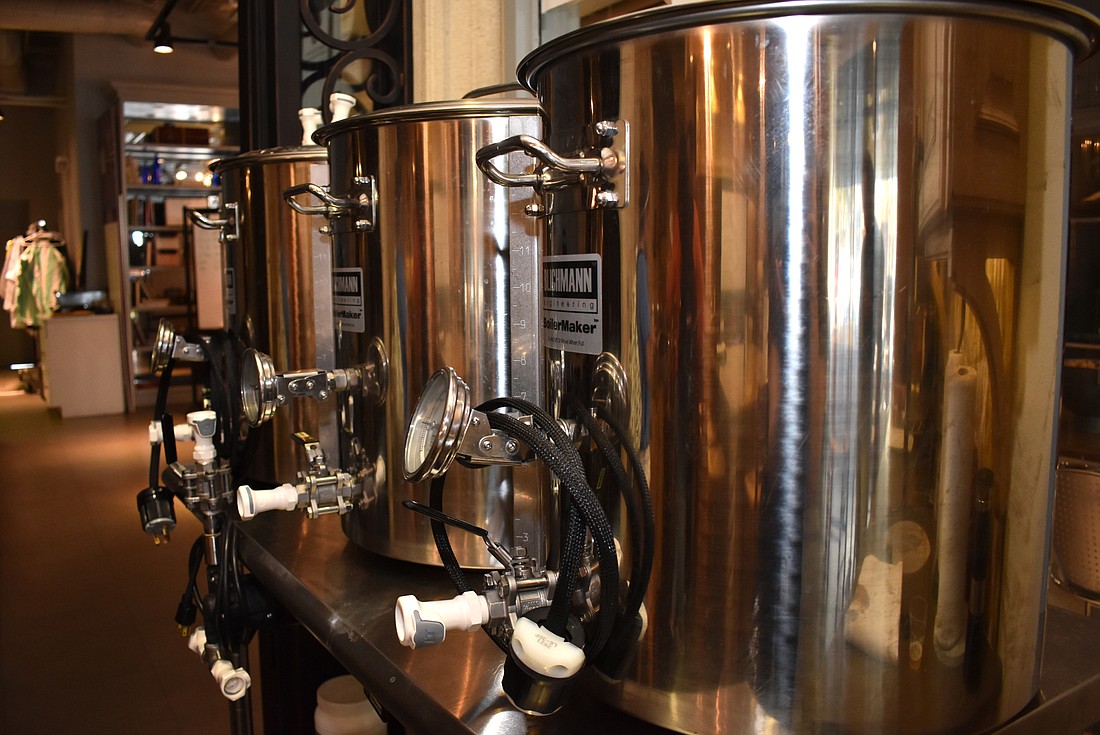- April 25, 2024
-
-
Loading

Loading

Students do much more than just go over the syllabus on the first day of the introductory beer science class at USF Sarasota-Manatee.
To kick off the semester, Chemistry and Microbiology of Beer and Introduction to Beer Science students sat at islands in the USF Culinary Innovation Lab in Lakewood Ranch and sniffed, sipped and analyzed the taste of a white peach IPA.
This beer, made with the help of brewers at Big Top Brewing Co., is just one of many made every semester by USFSM students since spring 2014. But this semester, with the biggest class yet, several developments could cause the class to grow so much it might have to split into two sections in the near future.
The elective teaches brewing and tasting techniques along with the chemistry of beer, thus applying to a wide array of students whose area of study may or may not have anything to do with the beverage industry. Many of them just love beer.
USFSM chemistry faculty member Ken Caswell and food and beverage instructor Joe Askren developed the introductory beer science program as two classes in one — one with a science angle and the other with a hospitality focus. Askren says the learning experience is enriched with multiple majors in the room.
When they approached several local brewers to partner with them for the course, none said no. One of those eager partners was Big Top Brewing Co. Brewmaster Josh Wilson, who recently donated a stainless steel, 14-gallon fermenter from his personal collection to double the output of the course’s instructional brewing system.
“They’re donating learning experiences that go beyond these four walls,” Askren says of their partners’ support.
Caswell calls the chance to work with head brewers and brewmasters at local breweries an experiential learning opportunity for his students. Unlike the written final exams that college students are accustomed to, beer science students develop recipes and produce a signature beer that is presented at an end-of-semester tasting event, all with the help of their professional brewing partners.
In the past three years, these partners have expanded into the Tampa and St. Petersburg area, including not only Sarasota and Bradenton breweries such as Big Top and Motorworks Brewing, but also Green Bench Brewing Co., Coppertail Brewing Co. and Cigar City Brewing Co.
This year, along with brewery tours, students get the opportunity to observe Big Top create a special ale in celebration of the World Rowing Championships.
New this semester is a partnership with Florida Worldwide Citrus in Bradenton. Although it’s not a brewery, many beverage companies use the company’s fruit-based flavorings in their products, and brewers in particular can use them to impart citrus notes into seasonal beers and special batches.
Juan Bosso, head chemist for Florida Worldwide Citrus, is a former beer science class student who’s proving that a USF science degree opens several doors in multiple industries, including food and beverage.
“What I was interested in doing here is having the kids do something other than the traditional biology degree,” Caswell says.
Erika Johnson is a former biology student who drove down from the USF Tampa campus every week to take the 8 a.m. introductory beer science class in fall 2016. She earned an internship with Coppertail Brewing with the knowledge she gained, and now she works as a microbiologist at Argo Lab, a Largo-based dietary supplement company.
Johnson says one reason she got the Argo Lab job — which she started the day before she graduated from USF — was because of the appreciation for learning the science behind everyday products that the course fosters.
“I think we thought about things differently,” she says of the class mindset. “I want the artsy fun side of it, but I also want to know what’s behind it — the process of brewing and everything else that goes into it.”
Another new opportunity for beer science students is a six-week USF Global study-abroad program that will begin this coming summer. It starts with two weeks at the university, followed by two weeks in France and two in Italy this summer. The six-credit-hour class for those interested in food and beverage studies will teach students about European culinary traditions and will partner with two world-class learning facilities in Italy and France.
A Beer Science II course is still in development, but the instructors have run an iteration of the course in which students work more closely with breweries, including more substantive internship opportunities in all aspects of this industry.
Johnson and Askren attribute the current popularity of craft beer to the outlook of young people who are willing to spend more money on a local brew with a unique flavor — many of them college students like these at USF.
“I think we like to take the old and the new and blend it,” says Johnson of millennials. “I think that’s our thing, and that’s what brewing is.”
Caswell and Askren hope to use this culture to expand on the program and create more tracks in the food and beverage sector of the hospitality department, specifically utilizing Askren’s knowledge of food and drink pairings.
“With beer, it’s wide open,” Askren says. “There are so many angles to pairing.”